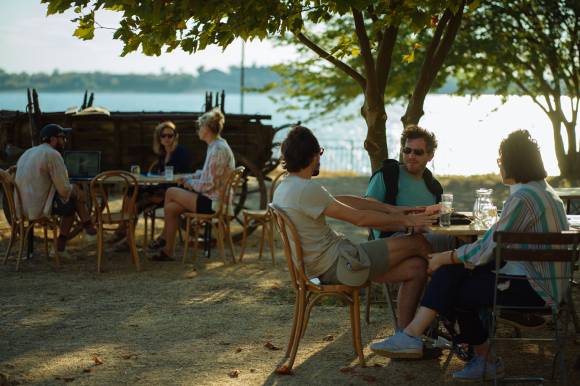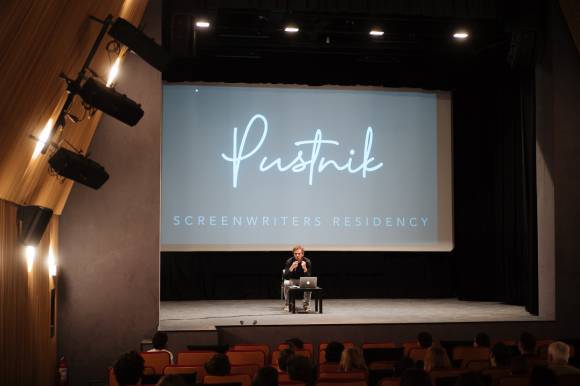With this latest edition of the residency, Pustnik screenwriting network started off its new cycle – a series of three development residencies dedicated for both new participants and alumni, working on their first or second feature films. Constructed as a support programme that nurtures emerging voices, Pustnik welcomes 16 feature projects throughout 2021-2022: 8 for its 2021 September edition, 4 for the April 2022 one which focuses on alumni projects in late development stage and 4 for the October 2022 residency dedicated to second features developed by its alumni.
This September, nine participants had the opportunity to work on their feature-length debut scripts during the eight days of the residency, with dedicated writing time, as well as tutoring, group sessions, individual sessions and peer feedback. The guests of this edition were script consultants Matthieu Taponier (script and film editor, Son of Saul by László Nemes, and  Beginning by Dea Kulumbegashvili; co-writer and editor on Nemes' Sunset) and Claudia Bottino (co-writer Ainsi soient-ils, ARTE; Sirin by Senad Šahmanović) and producers Julie Billy (Jonas Carpignano’s A Chiara; Gagarine by Fanny Liatard and Jérémy Trouilh) and Bianca Oana (Touch Me Not by Adina Pintilie, Collective by Alexander Nanau). Furthermore, the participants have enjoyed three evenings of screenings and extended discussions on some of the tutors’ most well-known projects and fellow residents’ previous works.
Beginning by Dea Kulumbegashvili; co-writer and editor on Nemes' Sunset) and Claudia Bottino (co-writer Ainsi soient-ils, ARTE; Sirin by Senad Šahmanović) and producers Julie Billy (Jonas Carpignano’s A Chiara; Gagarine by Fanny Liatard and Jérémy Trouilh) and Bianca Oana (Touch Me Not by Adina Pintilie, Collective by Alexander Nanau). Furthermore, the participants have enjoyed three evenings of screenings and extended discussions on some of the tutors’ most well-known projects and fellow residents’ previous works.
For four days, educational workshops and screenings also took place in the nearby village, at the Cultural Centre and the local High School, hosted by Pustnik alumni Ioana Țurcan and Răzvan Oprescu, attended by over 100 participants. The educational programme will continue throughout 2022, in parallel with the development residencies.
Upon returning to Bucharest, the residents and guests joined a masterclass held by Matthieu Taponier and a special screening of László Nemes’s Son of Saul, at Elvire Popesco Cinema within the French Institute. The Pustnik masterclasses are a new addition to the programme, meant to offer insights into the screenwriting craft and held by renowned practitioners who join the annual tutoring team. 2022 will welcome two more such masterclasses, which are to be announced in the following months.
About Pustnik:
Pustnik is a year round programme and the first international screenwriters residency to take place in Romania. It aims to create an environment dedicated to peace of mind and clarity of thought, away from modern pressures. Pustnik is also a growing network of film professionals and a community whose aim is to ease and encourage collaboration across the international cinema industry.
For more information:
www.pustnik.com
www.facebook.com/pustnik
Dan Angelescu – This email address is being protected from spambots. You need JavaScript enabled to view it.
Pustnik is organized by T.E.T.A Association
TETA is an NGO founded in June 2006 with the purpose of developing cultural activities and alternative education to stimulate cultural revival within overlooked communities. TETA also produces films and theatre performances.
Cultural program co-funded by the Administration of the National Cultural Fund (AFCN), Romanian Film Center (CNC), Dacin Sara, Romanian Filmmakers’ Union (UCIN), Goethe-Institut Bucharest, French Institute Romania
Partners: National University of Theatre and Film "I.L. Caragiale" - UNATC Bucharest, Cinema Elvire Popesco, Transilvania Film
Media partners: Film New Europe, Films in Frame, AaRC – All about Romanian Cinema, Observator Cultural
The program does not necessarily represent the position of the Administration of the National Cultural Fund. AFCN is not responsible for the content of the program, nor for the manner in which the results of the program might be used. These are entirely the responsibility of the beneficiary of the grant.




















